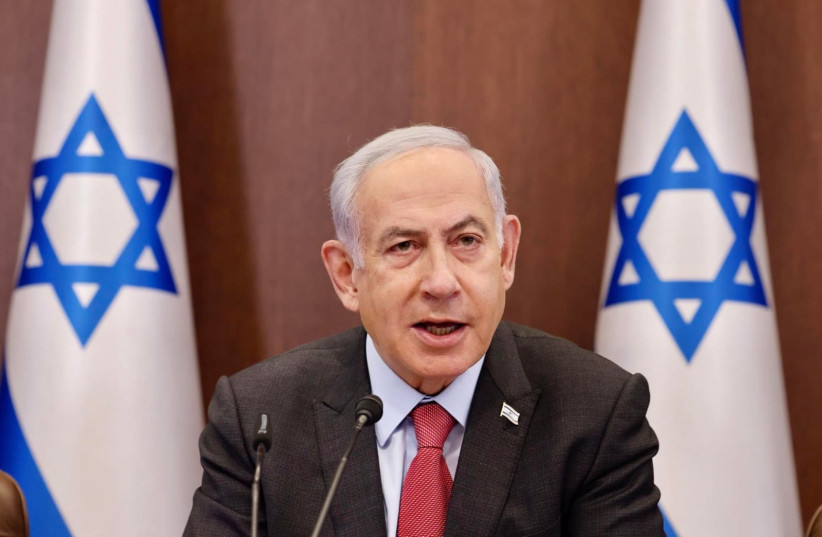Prime Minister Benjamin Netanyahu or his associates intentionally stoked tensions with Qatar by leaking a tape in which he insulted Doha’s efforts to negotiate a deal, the families' campaign to free the hostages said in a sharply worded statement on Thursday morning.
"All conversations that take place in meetings with the Prime Minister are recorded by his office and his associates present at the meeting,” the campaign’s spokesperson Haim Rubinstein said.
“The families participating in the meeting had their phones taken at the entrance,” Rubinstein explained.
“The decision whether to leak information concerning the deal and its intermediaries is the Prime Minister's office,” Rubinstein stated.
He spoke in response to a story on Channel 12, which featured a leaked recording from the closed-door meeting held with the family earlier this week in which Netanyahu could be heard referring to Qatar as a “problematic mediator.”

Rubinstein said that “the fact that the censorship permitted publication of the [tape] is serious and indicates a loss of judgment. The cabinet's duty is to prevent a crisis that would endanger the lives of the captives.”
The decision not to censor the publication of the tape and thus “endanger the lives of the hostages” after they were already abandoned on October 7 is a crime!” he said.
“We demand that the members of the cabinet stop the madness and act responsibly to save the lives of 136 Israelis who were abandoned and kidnapped,” he stated.
Rubinstein charged that “an organized campaign is underway against them with one goal: to delegitimize the hostages who are in the hands of the monsters of Hamas!"
He spoke up after Qatar called Netanyahu’s comments “irresponsible” and said they were harming efforts to mediate a deal to release the captives.
Qatar "appalled" to hear of Netanyahu's remarks
Qatar’s Foreign Ministry spokesperson Majed Al-Ansari said Doha was “appalled” to hear of Netanyahu’s remarks in a post on X in which he also accused the Prime Minister of harming the talks.
“These remarks, if validated, are irresponsible and destructive to the efforts to save innocent lives, but are not surprising,” he said.
Qatar’s comments came as it is attempting to mediate, together with Egypt, a deal for the release of the remaining 136 hostages in Gaza, out of the 253 Hamas seized during its October 7 attack against Israel. Some 110 of those captives have been released and the IDF returned to Israel the bodies of another 11.
Ansari said that “If the reported remarks are found to be true, the Israeli PM would only be obstructing and undermining the mediation process for reasons that appear to serve his political career instead of prioritizing saving innocent lives, including Israeli hostages.”
“Instead of concerning himself with Qatar’s strategic relations with the United States, we hope Netanyahu decides to operate in good faith and concentrate on the release of the hostages,” he said.
Ansari noted Doha, together with Egypt, had mediate a successful deal in November in which 105 of the captives were freed. Since then “Qatar has been engaged in regular dialogue with the negotiating parties, including Israeli institutions, attempting to establish the framework for a new hostage agreement and the immediate entry of humanitarian aid into Gaza.”
Smotrich backs Netanyahu, denounces Qatar on X
Finance Minister Bezalel Smotrich publicly backed Netanyahu by attacking Qatar in a post on X, in which he charged that it was a “country that supports terrorism and finances terrorism.”
Qatar “is Hamas’ patron and is largely responsible for the massacre committed by Hamas of Israeli citizens.
“The West's attitude towards her is hypocritical and based on improper economic interests. The West can and should exert much stronger levers on her and bring about the release of the abductees immediately,” he said.
“One thing is clear,” Smotrich said, “Qatar will not be involved in what happened in Gaza the day after the war.”
The animosity between Israel and Qatar, which do not have diplomatic relations, comes amid increased tensions between Israel and its Middle East ally Egypt, with whom it has had formal relations since 1979.
At issue in particular has been Israel’s insistence that to prevent arms smuggling into Gaza it must control a buffer zone in the enclave by the Egyptian border, known as the Philadelphi corridor.
Egypt's President Abdel Fattah al-Sisi on Wednesday accused of holding up aid deliveries for the Gaza Strip as a pressure tactic to push Hamas to free the hostages.
"This is a form of pressure on the Gaza Strip and its people over the conflict and the release of hostages. They are using this as a pressure tool on the people of the Strip,” Sisi said in comments to mark Egypt's national police day.
"We used to send Gaza 600 trucks a day. But for the past two to three days, we have not delivered more than 200 to 220 trucks (of aid) per day. How are these people (in Gaza) living?" Sisi said.
"Egypt's Rafah crossing is open 24/7 every day of the month. But the procedures taking place on the Israeli side for us to send in the aid without it being blocked by anyone, they are the reason (for holdups)."
Data from UN agency UNRWA shows fewer than 200 trucks entering Gaza daily since Jan. 24.
Israel says its role is only to inspect aid going into Gaza for security reasons and has denied holding up or rejecting humanitarian supplies.
"Our inspection process is efficient, with us scaling up our capacities to maximize inspection capabilities," COGAT, an Israeli Defence Ministry agency that coordinates aid deliveries with the United Nations and humanitarian groups, said on social media platform X on Wednesday.
"There is no limit to the amount of aid that can enter Gaza.”
Earlier this week government spokesperson Eylon Levy said that trucks entering Gaza had the capacity to carry more than what the international community had sent for Gaza.
Reuters contributed to this report.
